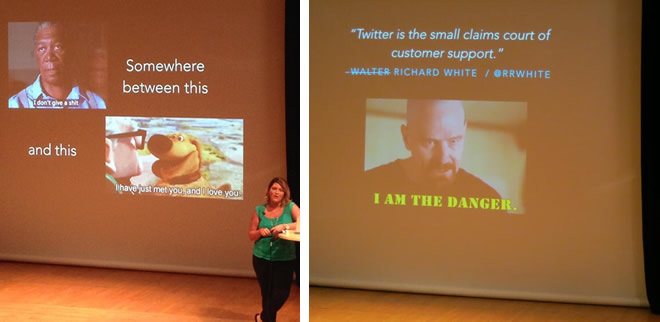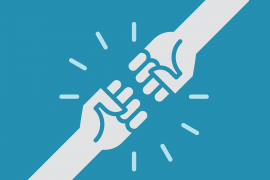Last week Michael O’Riley (Head of Support) and I attended Business of Software 2014 Europe for two days of inspirational talks and networking.
A number of the sessions looked at providing better customer service, so here’s a few tips on this key area.

Gaming app developer and guru Kathy Sierra introduced us to the concepts behind producing killer apps. These included taking into consideration the context that the app is being used in; the key being that we focus too much on making product X better rather than getting people to be better users of X.
A big pitfall is that we don’t always acknowledge the pain that a user has to go through to get the app to do what they want it to. Many developers simply expect users to have the knowledge they do and all too easily ignore the real pain and frustration a user might be experiencing.
Helping users to feel that their problems are temporary or typical is key to motivating them to believe that this is simply a step towards ultimate success.
Day one closed with a session from former CD Baby owner, Derek Sivers. Derek’s happy nature and positive approach is infectious and in itself an enviable quality to adopt when dealing with customers. The session was an outline of six great customer service philosophies that he had gleaned over his years at CD baby and since. Here are his top tips:
1. You can afford to be generous – Good service comes from generosity and abundance. Bad customer service comes from a feeling of scarcity and survival mode type thinking. Generosity is based on the long term outcomes whereas survival mode thinking forces us to focus too much on the short term.
2. The customer is more important than the company – Derek highlighted a value choice between being defensive of your brand and doing what’s right for the customer. Placing the customer first has to be the number one priority – they are your business and your best brand ambassadors after all.
3. Customer service is a profit centre – whilst sales are obviously more profitable, the profits to be gained from this powerful area are huge. We should all be investing heavily in this area and recognise the difference it makes to our bottom line.
4. Every interaction is your moment to shine – we have so many touch points with a client, the vast majority of them coming after the sale. Good customer service isn’t about being as efficient as possible; friends are not efficient. Inefficient time allows the opportunity to build a more personal relationship with your customers.
5. Lose every fight – Being happy to lose every fight is another way to ensure that the customer is first. It’s a difficult discipline, but it’s important for anyone working in the customer service sphere to catch themselves before being defensive. Practicing empathy is key to this and remember that the loudest critics are often potentially your loudest advocates.
6. Rebelliously right the wrongs of the world – You have an opportunity to show everyone else how it’s done. Not following norms in dealing with people is a potential for competitive advantage. Think of the worst customer experience you’ve ever had and do the opposite.
The day culminated in a great meal and opportunity to spend time with peers at all levels of the business. It was interesting for me to witness that whether talking to someone who had sold their company for millions, or had a company that had been going for 10 years, or were a new startup, the challenges we face and the opportunities we are presented with are incredibly similar.
Day two included a number of interesting talks including one from Sarah Hatter, formerly of 37signals, and now of CoSupport. Sarah gave a presentation on ‘humanising the web’.
She presented ideas on how we can ensure that our communications with customers are less robotic and more personable. The session was primarily focused on the language that is used on websites and in email communications, with advice on how to make them more friendly.
Whilst these things may be obvious, it was good to remember that small tweaks in the way that we speak can have a massive effect on the outcome of the conversations we have and the relationships that we are trying to cultivate.
Reflecting on the lessons learnt over the two days, I feel proud to say that at Streamtime, we place a lot of emphasis on customer service. It’s one of our main propositions to new and existing clients. We have developed a culture of caring about our customer’s needs, of going the extra mile and doing what we can to ensure their success. But there is always room for improvement, and the BoS conference provided some great tips on how to sharpen those skills.







